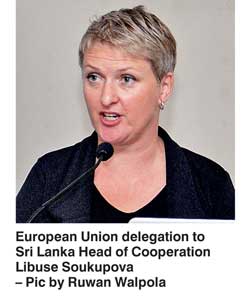Monday Feb 16, 2026
Monday Feb 16, 2026
Thursday, 22 June 2017 00:00 - - {{hitsCtrl.values.hits}}
By Charumini de Silva
With the global IT industry projected to grow by 4.1% to beyond the $ 3.5 trillion mark this year, Sri Lanka promises to play a leading role further on the horizon, observed European Union Delegation to Sri Lanka Head of Cooperation Libuse Soukupova, pointing out that IT/BPO is the fastest growing non-traditional export sector to foster.
“A strategic geographical location, good ICT infrastructure, cost-competitiveness, skilled labour, an enabling regulatory framework and rigorous intellectual property protection continue to promise sustained growth for the industry,” she said at the opening session of the EU-Sri Lanka Trade-Related Assistance Project conducted by the International Trade Centre (ITC) on export marketing planning for the IT/BPO sector held in Colombo yesterday.
However, Soukupova said as the sector is relatively young with many enterprises having been set up during the last decade some challenges remain in the form of limited export experience and market engagement.
The four-year EU-funded project worth € 8 million contributes to inclusive trade-led growth and regional integration on the four focus areas of the trade policy component, national export strategy, trade facilitation and quality infrastructure. The project includes a component on the ITO/BPO industry which aims to increase the competitiveness of Sri Lankan SMEs in this sector.
Out of over 40 applications 24 IT/BPO companies were selected for a three-day training workshop covering introductory aspects of Export Marketing Planning by ITC and its collaborating partners the Department of Commerce (DOC), the Sri Lankan Export Development Board (EDB), the Sri Lanka Association for Software and Service Companies (SLASSCOM), working closely with the Information and Communication Technology Agency of Sri Lanka (ICTA) and the Federation of Information Technology Industry Sri Lanka (FITIS).
While acknowledging that IT/BPO is the new kid on the block of Sri Lanka’s export basket, which has recorded steady growth, EDB Chairperson Indira Malwatte said a well-designed export marketing plan is essential for guiding enterprises in their exporting activities and supports the creation of a sustainable overseas business relationship. As Sri Lanka has moved into middle income status, the country no longer receives assistance and grants and therefore she said it was critical to boost exports.
“Fortunately or unfortunately Sri Lanka has now moved into a middle income stage, so we no longer get assistance and grants. But my firm belief is that we are middle income only in the Western Province. Thus we have to work hard for the best of the country’s economy and to get exports rising,” she added.
Malwatte expressed her confidence in achieving $ 5 billion in export earnings from the IT/BPO sector by 2020.
ITC Senior Advisor Miyoba Lubemba said they were conducting the training program on four key components which will deliver tangible value to the IT/BPO sector of Sri Lanka.
Acknowledging the EU’s assistance and Government support, she asserted that ITC looks forward to train at least 100 firms over the coming years.
“We are emphatic on our intervention even after we exit the program. We hope that the program will continue on the foundation we have set out and deliver value to the IT/BPO sector,” Lubemba said.